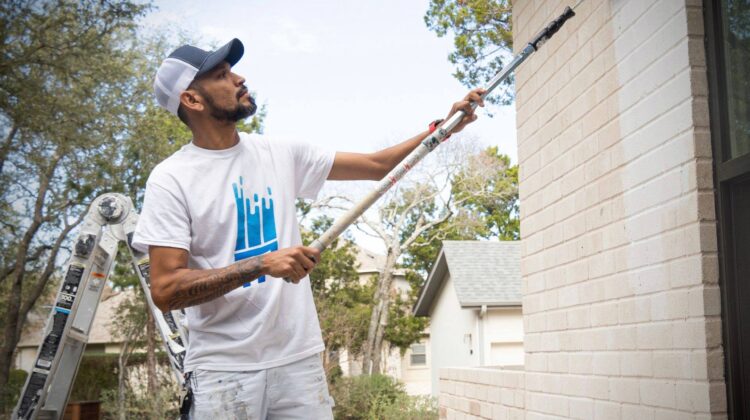
No-Sweat Sweaty Startups
The Shiver Looks at How to Break into a New Business Trend
“The true entrepreneurs are just regular people starting businesses.”
Nick Huber, Founder: The Sweaty Startup
Interested in building your own business but not a big fan of coding? Curious about startup culture but recent headlines got you feeling skittish re: technology overall?
You’re in luck: A new kind of startup is on the rise. And its vibe is very, very old school.
Meet the “sweaty startup,” your passport to launching a rewarding business without being a once-in-a-generation prodigy or hosting your own tech bro incubator outside San Francisco Bay.
Here’s an overview of what makes a sweaty startup, along with some pointers on how to create your own sweaty business from the ground up. (We’ve also included a few of our favorite sweaty industries for added inspo.)
Break out those tank tops, sweat seekers. It’s about to get warm in here.
What’s a “sweaty startup”?
A sweaty startup is everyman’s answer to those small tech businesses with billion-dollar potential, made popular by Silicon Valley (the place and the show). Instead of focusing on the “next big app” or the newest thing in social media, sweaty startups build real, highly profitable businesses around basic services everyone needs––but few people think of as a 21st-century path to fame and glory. These basic services are frequently connected to home care and maintenance (e.g., lawn mowing, bricklaying, pest control, etc.), and often require more than a few drops of sweat. Hence the name: “sweaty startup.”
Lately, savvy entrepreneurial folks like Nick Huber have noticed these sweaty industries carry a lot of opportunity for “everyday” people looking to kick off their business owner careers. Sweaty service spaces typically demand very little in the way of money, risk, or skill, and the market need is usually so great, the competition never gets too hot to handle. This means good, solid work in these fields can almost always command a healthy price. (Note: This sweaty sphere used to be considered “blue-collar,” but that doesn’t make it any less enterprising. And we don’t think of blue- collar as a negative, anyway.)
<TL;DR> In a landscape where “business leader” tends to equal someone responsible for a tectonic shift in the market like Uber or the iPhone, sweaty self-starters are people like us, reaching our financial goals and achieving legacy success without necessarily hitting the Jeff Bezos tax bracket. Which is still pretty amazing. As Huber puts it: “[Even] if I’m in the 50th percentile, if I’m better than half the people, I can do really, really well.”
To which we say: Heck yeah.
What do you need to start one?
First and foremost, you’ll need the obvious: drive, patience, a little bit of capital, and some supplies (or, at the very least, a plan to rent or buy whatever appliances, cleaning materials, or other essentials you might need).
Beyond these, some nice-to-have sweaty qualities include:
- A fundamental grasp of what you’re doing. Sweaty startups are billed as “low skill,” but if you find a business idea that speaks to you, do your research. Yes, anybody can pick up a paintbrush, but not everybody can ensure even coverage or a spotless finish. If you’re hoping to make money, you’ll have to demonstrate a certain level of proficiency. Or find a partner who can properly train you and your staff.
- Some pep in your step. Huber warns that speed is the “most important factor by far” when it comes to sweaty services, in part because a lot of sweaty industries have a real scheduling backlog problem. The faster you can swoop in and offer your expertise to anxiously waiting customers, the quicker you’ll be able to make money and establish yourself as a reliable business.
- Access to the public. Most sweaty services are community-based businesses that thrive on local reputation and neighborhood recommendations. You’ll need to make yourself available to prospective customers through phone, text, social media channels, and good ol’, real-world face time. And like it or not, you may also need to pound some pavement. Self-professed sweaty starter Brian O’Kelly notes this can be a great way to get your business off the ground: “If you knock on 100 doors, at least one person will say, ‘[O]h, give me a quote,’” he says.
What other factors should you consider?
Loads. Sweaty startups aren’t foolproof. As with any business, you’ll need to tread carefully and do a lot of legal and logistical homework before you commit. Here are just a few things to consider:
Market niche
Once you’ve decided on your field, start thinking about scope. What’s unique about you, your locale, and/or the service you can provide? Who are you hoping to serve? Ideally, who will be your local/national competition? Will your skills lean more specialist or general? (Huber advises finding a not-too-narrow niche and sticking to it. This way you’ll stand a better chance of differentiating yourself, especially if you’re dealing with a larger pool of potential customers.)
Outreach
As mentioned above, making yourself available is a must. But if door-to-door or word-of-mouth strategies aren’t bringing in enough customers (or you simply don’t have time to implement a face-to-face approach), you might want to leverage a marketing solution to help grow your consumer base. If you don’t feel your team has the bandwidth to maintain a marketing strategy, a small third-party firm might be helpful. But if this option sounds too costly, consider a business partner with access to in-house marketing resources, so you can leave the outreach to the professionals without having to blow through your savings.
Flexibility
Remember “pick a niche and stick with it”? Well, not if it’s bleeding you dry. Part of the deal with sweaty startups is knowing when to pivot. If you’re a house painter but the neighborhood demand for deck staining services is at an all-time high, be ready to adapt and expand your skillset as needed. Trends will shift. Tastes will change. Don’t be so stubborn about your offerings you miss the chance to strike gold.
“Big Picture” vs. “Short Term”
Building a business with staying power takes time. You’ll be in this for the long haul, so don’t settle for a venture that’ll end up on the endangered species list. Get to know the difference between a passing fad and an evergreen product. Gravitate toward services everyone will always need (“I wash windows!”) rather than ones that are strictly seasonal (“I only install Christmas lights!”) or likely to go out of style in a few years (“My business is water beds!”).
Go for sweaty fields with enough steady demand you’ll be able to set up shop quickly and see returns in the short term––all while simultaneously preparing for long-term gains.
Logistics and equipment
Exercising your freedom to start a business does not mean exercising your freedom to phone it in. Don’t skimp on details like budgeting, forecasting, balance sheets, tax filings, employee benefit plans, etc. One day you’ll hopefully be able to hire someone to handle this stuff for you, but, if you’re on your own (i.e., no business partner or parent company in your corner), you’ll have to take on all the administrative tasks yourself. At least for now.
And don’t be stingy with your materials. If the quality of your work depends on a specific piece of equipment, invest in the equipment. (You can’t power wash a driveway with just a hose.) Too expensive? Try renting until you get enough capital together to buy your own.
What are some sweaty startup examples?
Now comes the fun part. Our current favorite sweaty startup ideas are as follows (we’re a little biased about these, obviously, but that doesn’t mean we’re wrong about how awesome they are):
House painting
Talk about evergreen. No matter if it’s inside or out, house paint will always be exposed to the elements. So, it’ll always need a refresh every now and then. Add to this sometimes people just want to shake things up with a splash of color, and you’ve got the makings of a super successful enterprise.
Bonus: If you get ambitious (or you buy into a franchise with a top-tier training program), you can supplement your service roster with paint-adjacent projects like staining, lime washing, odor removal, and more.
Window washing
Another industry that’s not going anywhere anytime soon. As long as there’s buildings, there’s gonna be windows. And those windows are gonna get dirty. If you’ve got a passion for cleanliness, a team of washers, and a dream, you could be the proud owner of a wealthy window-washing business in no time. Plus, just like with painting, you can investigate expanding your offerings with similar home services such as gutter or screen cleaning.
Garage renovation
We know firsthand there’s a lot of post-pandemic demand in this space, but not nearly enough supply. And while the messy, ad hoc, catch-all garage may be an age-old problem, sweaty starters can easily provide a modern solution (or two…or five). The possibilities here are endless: You can specialize in door installations, epoxy flooring, organization, lighting…you name it. The more services you can manage, the bigger your slice of this rapidly growing pie, thanks to a variety of developments, including an uptick in home ownership rates and a post-COVID trend toward spatial optimization. The best part? The landscape is wide open. There are very few competitors––especially when compared to other sweaty concepts––so you’ll have a lot of work cut out for you before you even get started.
Tempted by these sweaty startup ideas but want to avoid the administrative hassle? ResiBrands offers turnkey franchise solutions that might be just what the doctor ordered. Our impressive lineup of sweaty industries includes all the niche markets we’ve mentioned––painting, window washing, garage makeovers––and more. Want to learn about the advantages a franchise partner can afford you? Let’s talk.
Keep getting after it, sharks. And don’t be afraid of a little sweat.
-Shiver HQ

